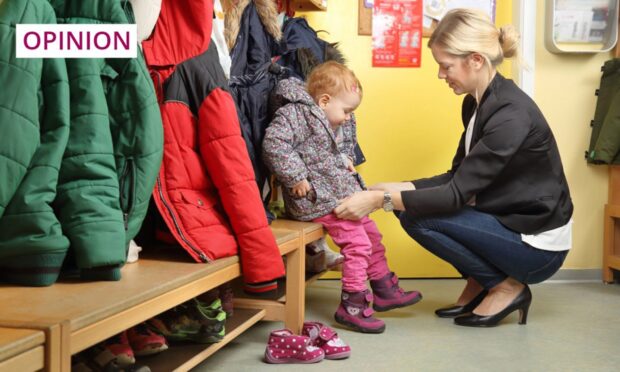“We’ve never been so skint and so worried.”
Those words from a mum, currently on maternity leave, should ring loudly in Scottish Government ministers’ ears.
According to our research at the Scottish Women’s Budget Group, parents across Scotland are buckling under the strain of the cost-of-living crisis, combined with eye-watering childcare costs.
Pre-school childcare costs in the UK are among the highest in the world, with parents shelling out, on average, £1,106.52 a month in fees. In Scotland, parents of under-twos can face even steeper charges, with Aberdeenshire having the unenviable crown of the most expensive region for childcare in Scotland. The average monthly bill there comes in at a whopping £1,341.98.
When you add the high cost of food, energy and other essentials into the mix, many parents are left trapped in – or teetering on the edge of – poverty.
Nearly three quarters of mothers across Scotland told us that the increase in other household costs was impacting on their ability to manage childcare costs. And the wider toll these rising costs are taking is stark, with women reporting that their finances, mental health and careers are all taking a battering. Nearly half of respondents told us the challenges of managing childcare have influenced their decision not to have another child.
These problems are heightened for single parents and disabled women, with both groups reporting even greater impacts on family finances and the paid work they’re able to do.
Women are bearing the brunt
Limited help exists for parents in Scotland, with three, four and some two-year-olds entitled to Scottish Government-funded childcare support. However, for most children under the age of three, there is zero subsidised support available.
As the UK Government prepares to roll out funded childcare provision to all two-year-olds in England from next month, Scottish Government ministers should reflect – ahead of International Women’s Day (March 8) – on whether the expansion of their own childcare scheme is going far and fast enough.
And, while greater childcare support is needed, so too is investment in the childcare sector, with many providers risking collapse as they face soaring operating costs and significant staff recruitment and retention challenges.
In the Scottish budget, the government committed to paying staff delivering funded childcare in the private, voluntary and independent sectors at least £12 per hour. But this commitment falls far short of what’s needed, and completely fails to address the wider investment required to expand funded childcare provision.
Of course, it’s mainly women who are paying the price, pushed to either reduce their working hours or give up work entirely to care for their children. As a result, women are too often forced into a vicious cycle of poverty. They spend years in the employment wilderness, and subsequent lifetimes making less money in less senior jobs than men, before being faced with a pension black hole following years of no or reduced earnings.
Scottish Government must tackle parent poverty
We all know that if the Scottish Government is to deliver on its legal child poverty targets then it must tackle parent poverty. Childcare is basic social infrastructure, which, if designed and delivered well, can help ministers achieve both their child poverty and gender equality ambitions.
Part of the problem is that caring for children – whether it is undertaken by parents or paid professionals – is fundamentally undervalued. There is no better example of carers’ invisibility than in the Scottish Government’s overarching vision for the country, captured in 11 “National Outcomes” – the goals which the government says describe “the kind of Scotland” it wishes to create.
Carers of all kinds – not just parents – are skint and worried
Currently, care and the role of carers are almost completely absent: a glaring omission which A Scotland That Cares (a campaign backed by 70 organisations, including the Scottish Women’s Budget Group and Oxfam Scotland) aims to change when draft new National Outcomes come before parliament, imminently.
Carers of all kinds – not just parents – are skint and worried. MSPs from all parties must ensure they take both the immediate and long-term action required to relieve pressures on carers, building a truly caring country in which all carers – and those they care for – are both visible and valued.
Carmen Martinez is coordinator of the Scottish Women’s Budget Group


Conversation